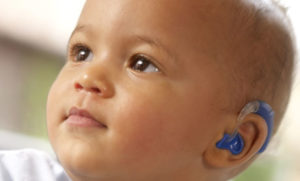 Childhood hearing loss is a serious issue facing many of our young school-aged children. Sometimes there are signs that your child has some hearing concerns. However, when parents aren’t aware, their child could be facing severe delays in speech and communication. As time passes, they are missing a lot of information that could affect their future.
Childhood hearing loss is a serious issue facing many of our young school-aged children. Sometimes there are signs that your child has some hearing concerns. However, when parents aren’t aware, their child could be facing severe delays in speech and communication. As time passes, they are missing a lot of information that could affect their future.
There are many causes of childhood hearing loss and the more we as audiologists, parents, physicians and educators know and share, the better the chance we have at early intervention and giving these children their best shot at a successful future.
Causes of Congenital Hearing Loss
Congenital hearing loss is that which is present at birth. The causes are not always easily identified and there are genetic and non-genetic factors. For example, birth complications like the presence of herpes, rubella cytomegalovirus, toxoplasmosis or another serious infection, lack of oxygen or the requirement of a blood transfusion for some reason could play a role. Premature birth and the use of ototoxic medication by the mother during pregnancy are also factors.
Other things like infections, maternal diabetes and drug or alcohol abuse by the mother or smoking during pregnancy could also lead to a loss of hearing. In addition, some genetic issues could be autosomal recessive hearing loss or genetic syndromes. Genetic factors cause more than 50 percent of all hearing impairment in children, whether present at birth or developed later in life.
Causes of Acquired Hearing Loss
Acquired hearing loss occurs after birth. This could be caused by:
- A perforated eardrum
- Otosclerosis or Meniere’s diseases, which are progressive
- Infections like meningitis, measles, mumps or whooping cough
- Taking ototoxic medications
- A serious head injury
- Exposure to loud noise, causing noise-induced hearing loss
- Untreated or frequent otitis media ear infections
- Exposure to secondhand smoke
Causes of Transient Hearing Loss
This type of hearing impairment is fluctuating and could really be serious when it comes to their speech and language development. Oftentimes, this is as a result of frequent middle ear infections. At least 75% of children have had at least one ear infection by the time they are three years old. This type of infection is very common in children because of the eustachian tube position during childhood. Frequent, untreated middle ear infections can cause cumulative damage to the bones, eardrum or auditory nerve, creating permanent, sensorineural hearing loss.
The earlier we screen and the more we know about the causes of childhood hearing loss or what to look for, the better we can give our children the support they need with this condition. If you notice anything worrisome about child’s hearing, contact their physician immediately and consider the help of an audiologist. We all want the very best for your child and it starts with early intervention and treatment of childhood hearing issues

